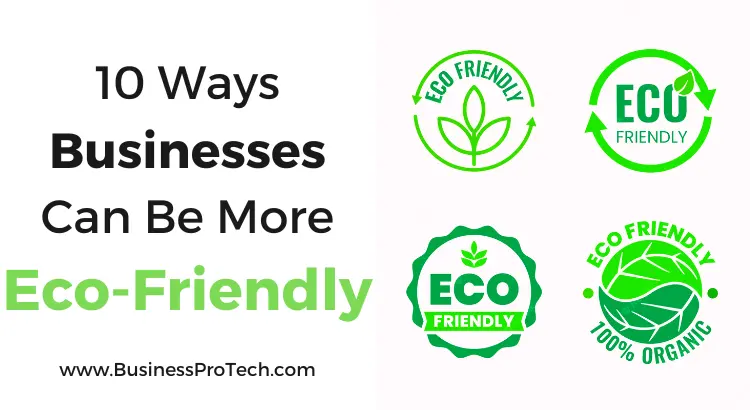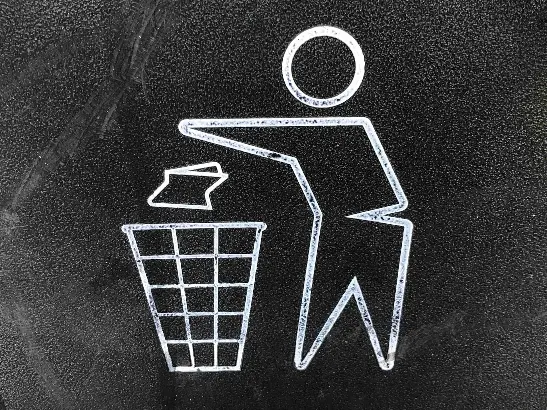Businesses, like people, can become more eco-friendly and environmentally conscious. Because a business is often larger and has more people than a home, the environmental footprint of a business can be much larger as well. However, it can also feel overwhelming to try and reduce the impact of a business on the environment.
Here are some easy ways that you can help your business or workplace to become more eco-friendly without too much stress or expense.

Reduce, Reuse, Recycle
The three Rs of the environment can extend to businesses. Encourage employees to reduce, reuse, and recycle materials in the office or workplace. People will be more likely to recycle if it’s easy to do, so provide separate bins for different types of waste. Locate recycling bins in easy-to-access areas so people don’t have to go a long way in order to use them.
In some cases, local regulations require tracking of waste and recycling rates. Recycling software can help keep of track recycling rates so organizations can see where changes are needed and how their programs are performing.
If you are not sure how much waste your business creates, or what the best recycling program would be, consider having a recycling audit done.

Use Sustainable Products
Consider using more sustainable materials in your business when possible. Purchase sustainable products that are made from eco-friendly materials, like bamboo or recycled plastic.
Avoid single-use plastics and opt for reusable products whenever possible. Some items, such as stir sticks and straws at the coffee station aren’t even needed. Instead, consider placing spoons at the coffee station for people to stir with.
Energy Efficiency
It is usually not hard or expensive to create more energy-efficient workspaces and businesses. In many cases, these energy-efficient changes will result in savings as energy bills will be lower over time.
One of the best ways to make your space more energy efficient is by switching to LED bulbs. Also, consider using shades to block light during the hot summer season, and make sure doors and windows aren’t leaking.
Encourage employees to turn off lights, computers, and other electronic devices when not in use. Use energy-efficient lighting, appliances, and heating and cooling systems. Installing timers or motion sensors on lights, thermostats, and other devices can also help reduce energy expenses by limiting the amount of time these things run when no one is using them.
Related Posts To Energy:
Go Paperless
Try to make your workplace less wasteful by using less paper in your day-to-day functions. Use digital documents and communications whenever possible to reduce paper usage. Employ the use of technology to help your employees communicate with each other, keep track of their assignments, and take notes.
Use digital scheduling and calendar apps, and consider using a whiteboard rather than paper when you need a physical writing surface.
When paper is necessary, use recycled paper or paper made from sustainable sources and encourage recycling by placing recycling bins in easy-to-access locations. Consider offering incentives to encourage your workers to sort their trash for recycling rather than throwing it all in the garbage.
Sustainable Transportation
Encourage employees to carpool, bike, or use public transportation to get to work. Provide bike racks and showers for employees who bike to work. If public transportation is available, consider offering a pre-paid subway or train payment card as a benefit to employees. This can encourage them to use more sustainable transportation while also helping them to save money.
Water Conservation
Install low-flow toilets and faucets in the office. If your business is one that naturally uses a lot of water, such as a laundry service or manufacturing company, consider installing water-saving features wherever possible.
Using drought-tolerant landscaping and avoiding large areas of grass is also a good way to reduce unnecessary water consumption. Many landscaping plants with low water needs are actually more attractive and require less maintenance than grass once they are established.
Also, consider using drip irrigation systems and watering landscaping at night to reduce the amount of water lost to evaporation.
Plant Trees
Planting trees is always an eco-friendly thing to do (when done the right way). Trees sequester carbon out of the air and hold it in place for a long time. Consider planting trees around your office or building to help reduce the carbon footprint of the business. They also help to clean the air, produce oxygen, and make your building and workplace look more welcoming.
Finally, once your trees are tall enough to provide shade, they can help reduce the cost of cooling your building in the summer. Use drip irrigation to water your trees until they are established.
Support Sustainable Suppliers
One easy and pain-free way to help your business become more eco-friendly is by carefully choosing which businesses you work with. Partner with suppliers who use sustainable practices and products, and who support an eco-friendly business model. Encourage suppliers to reduce packaging waste and use eco-friendly materials.
One of the easiest ways to work with eco-friendly businesses is by switching to local suppliers. Local companies can reduce your carbon footprint by limiting shipping and reducing packaging needs. You may also find that local companies are cheaper, partly because you eliminate the need to pay for shipping costs.
Educate Employees

Educate employees about the importance of eco-friendly practices and encourage them to be more mindful of their actions both in and outside of work.
Offer incentives for employees who take part in eco-friendly initiatives such as riding bikes or taking public transportation to work, supporting the effort to install more eco-friendly landscaping, and reducing energy costs in the workplace. Consider having company-sponsored events like helping with clean-up at a local natural area or sponsoring a tree-planting campaign.
Conclusion
While it might seem daunting to try and make an eco-friendly, environmentally sustainable workplace, by taking small steps it can be done with less pain and expense than you might think.
Choose a few of the changes that you think will make a difference and start implementing them. Explain to your employees what you are doing so you can get them on board. Finally, be patient! Change takes time, but it’s worth the wait.